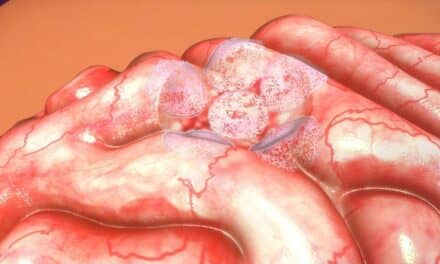Summary: Roche’s PATHWAY HER2 (4B5) test is an FDA-approved companion diagnostic (CDx) for HER2-positive biliary tract cancer, enabling targeted treatment with Jazz Pharmaceuticals’ ZIIHERA.
Takeaways:
- First-of-its-Kind Approval: The PATHWAY HER2 (4B5) test is the only FDA-approved diagnostic to identify BTC patients eligible for HER2-targeted therapy, addressing a critical unmet need.
- Enhanced Patient Outcomes: This standardized test offers BTC patients access to ZIIHERA, the first FDA-approved treatment for previously-treated, HER2-positive BTC, potentially improving survival rates.
- Expanded Utility: Already used for breast cancer diagnostics, the PATHWAY HER2 test now broadens its clinical applications, underscoring Roche’s commitment to advancing personalized cancer care.
Roche has received U.S. Food and Drug Administration (FDA) approval of a label expansion into biliary tract cancer (BTC) for the PATHWAY anti-HER2/neu (4B5) Rabbit Monoclonal Primary Antibody* test. This test is now the first and only FDA-approved companion diagnostic (CDx) to aid in the assessment of HER2-positive status to identify BTC patients who are eligible for treatment with Jazz Pharmaceuticals’ ZIIHERA (zanidatamab-hrii).
HER2 is a receptor protein expressed in a variety of cancers and serves as a predictive biomarker to help determine if a patient will respond to HER2-targeted therapy.(1) No approved and validated HER2 test existed to identify eligible BTC patients until the approval of this expanded label for the PATHWAY HER2 (4B5) test, according to Roche.
“This test is a step forward in furthering access to personalised medicine,” says Jill German, head of pathology lab at Roche Diagnostics. “The prognosis for patients diagnosed with BTC is poor, as very few treatment options exist. Now, these patients have access to the first standardised test that could make them eligible for targeted therapy, potentially improving clinical outcomes.”
ZIIHERA is the first FDA-approved treatment for adults with previously-treated, unresectable or metastatic HER2-positive (IHC 3+) biliary tract cancer.
BTC accounts for 3% of all gastrointestinal cancers in the US.(2,3) Prognosis is poor because of a lack of adequate early detection tools, challenging anatomical access, aggressive tumor biology, and only modest benefit from systemic treatments.(4) With most cases diagnosed at an advanced stage,(5) the five-year overall survival rate for all BTC cases is 19% for disease that is localized to the original tumour site, and just 3% for cancer that has spread to other areas.(6)
Further Reading
About the PATHWAY anti-HER2/neu (4B5) Rabbit Monoclonal Primary Antibody
The PATHWAY anti-HER2/neu (4B5) Rabbit Monoclonal Primary Antibody delivers timely, clear and reliable results, enabling therapeutic decisions that can lead to better outcomes for patients. Already indicated as an aid to identify breast cancer patients eligible for HER2-targeted treatment with Herceptin, KADCYLA, or ENHERTU,(7) the test is used in combination with the fully automated VENTANA BenchMark slide staining instrument. The introduction of the new indication for BTC represents a significant expansion of the test’s clinical utility. The assay forms an important part of Roche’s comprehensive gastrointestinal cancer solutions portfolio, which is aimed at driving diagnostic certainty for life-changing decisions in cancer care.
The assay standardizes all immunohistochemistry (IHC) processes from baking through staining, and reduces the possibility of human error.(8) It also minimises inherent variability resulting from individual reagent dilution and other processes found in manual and semi-automated IHC methods. The Roche HER2 (4B5) clone achieves consistently high proficiency assessment scores compared to other clones(9) and demonstrates high concordance with HER2 FISH,(10,11) empowering laboratories to employ the most widely adopted and reliable HER2 IHC primary antibody.
Further Reading: Roche Presents New Alzheimer’s Disease Diagnostic Data
* Hereafter referred to as PATHWAY HER2 (4B5) test
Featured image: PATHWAY HER2 (4B5) assay for biliary tract cancer. Photo: Roche
References:
- Yoon, J., Oh, DY. Nat Rev Clin Oncol 21, 675–700 (2024)
- Harding, J. et al. Zanidatamab for HER2-amplified, unresectable, locally advanced or metastatic biliary tract cancer (HERIZONBTC-01): a multicentre, single-arm, phase 2b study. Lancet Oncol 2023; 24: 772–82.
- Scott, A. et al. Precision Medicine in Biliary Tract Cancer. J Clin Oncol 2022 40:2716-2734.
- Referenced with permission from the NCCN Clinical Practice Guidelines in Oncology (NCCN Guidelines®) for Biliary Tract Cancer V.2.2024. © National Comprehensive Cancer Network, Inc. 2022. All rights reserved.
- Valle JW, Kelley RK, Nervi B, Oh D-Y, Zhu AX. Biliary tract cancer. Lancet 2021; 397: 428–44.
- Nakanuma Y, Kakuda Y: Pathologic classification of cholangiocarcinoma: New concepts. Best Pract Res Clin Gastroenterol 29:277-293, 2015
- PATHWAY anti-HER2/neu (4B5) Rabbit Monoclonal Primary Antibody, US Package Insert (D197603 Rev 1). 2024.
- VENTANA HER2 (4B5) Rabbit Monoclonal Primary Antibody RxDx Package Insert, 2024.
- NordiQC Assessments
- Mayr D, et al. Comprehensive immunohistochemical analysis of Her-2/neu oncoprotein overexpression in breast cancer: HercepTest™ (Dako) for manual testing and Her-2/neuTest 4B5 (VENTANA) for VENTANA BenchMark automatic staining system with correlation to results of BenchMark automatic staining system with correlation to results of fluorescence in situ hybridization (FISH). Virchows Archiv. 2009; 454(3):241–248.
- Brügmann A, Lelkaitis G, Nielsen S, et al. Testing HER2 in breast cancer: a comparative study on BRISH, FISH, and IHC. Appl Immunohistochem Mol Morphol. 2011;19(3):203-211.





